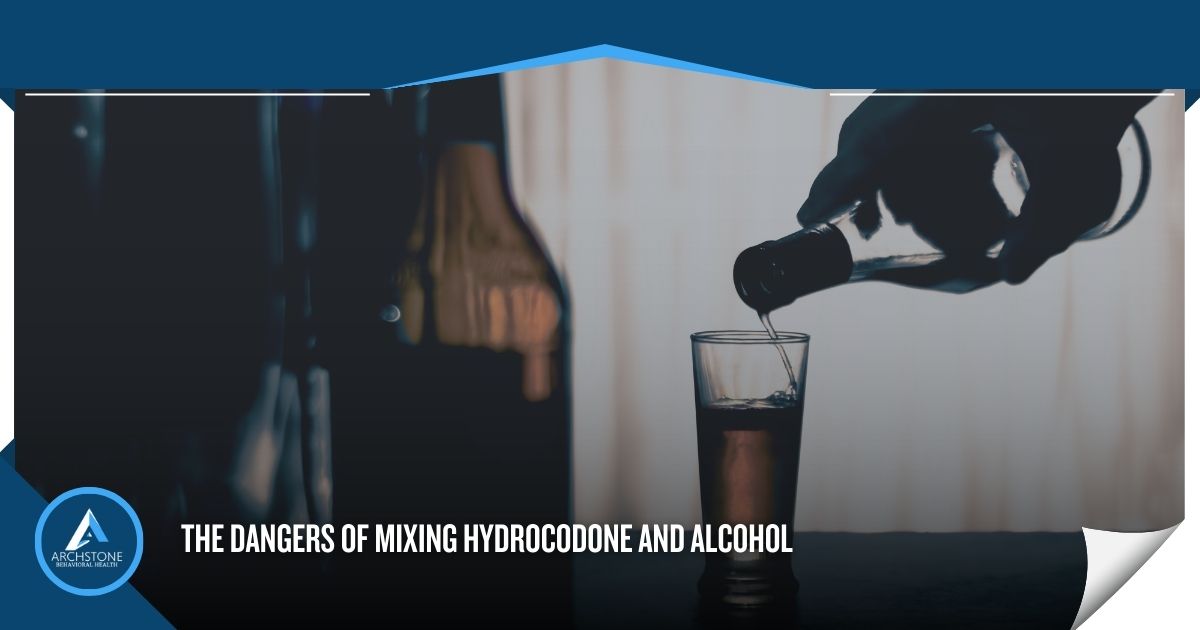The Dangers of Mixing Hydrocodone and Alcohol
Get Help Now
Alcohol use is common in the United States. Most adults in the country report drinking at least occasionally, and alcohol is widely available in many settings.
Studies show that about 66% of adults in the US take at least one prescription drug. While prescription medications can be safe when people use them as prescribed, many people misuse them.
Mixing certain prescription drugs with alcohol can have dangerous results. Hydrocodone is one addictive prescription drug that can interact dangerously with alcohol.
This article will explore the dangers of mixing hydrocodone. You will also learn about hydrocodone and alcohol abuse and where to find treatment.
Contact the Archstone Behavioral Health specialists now to learn about our addiction treatment programs. Our intake staff can verify your insurance details, schedule appointments, and answer questions.
What is Hydrocodone?
Hydrocodone is an addictive opioid drug. Several prescription pain relievers contain hydrocodone, including Vicodin. Drugs containing hydrocodone are common. In fact, medications that contain hydrocodone are the most commonly prescribed drugs in the United States.
Doctors may prescribe drugs containing hydrocodone to patients who have moderate to severe pain. People may take hydrocodone after having surgery, to manage chronic pain, or during treatment for another medical condition.
The Effects and Risks of Hydrocodone
Hydrocodone is an opioid drug. When people take an opioid, it binds to receptors in areas of the brain responsible for pain control, emotional regulation, and pleasure.
Hydrocodone can reduce sensations of pain. It can also cause other side effects, including:
- Sleepiness
- Nausea
- Constipation
- Dizziness
People may also experience severe side effects, including:
- Respiratory depression
- Low blood pressure
- Seizures
The Drug Enforcement Agency (DEA) classifies hydrocodone as a Schedule II drug. This means that it has a known medical purpose but has the risk of abuse and physical dependence.
Misusing opioid painkillers and other prescription drugs may lead to tolerance and dependence. Tolerance means that your body has adjusted to a dose of a drug. Your body may require higher doses of a drug to get the desired effects. Over time, you may develop a physical dependence on the drug.
Prescription drug misuse includes:
- Taking a higher dose of the drug than prescribed
- Taking a prescription drug for a longer period than prescribed
- Taking a medication more often than prescribed
- Ingesting the medication differently than prescribed, such as crushing and snorting your pills
- Taking a prescription medication without a prescription (recreational use)
Misusing hydrocodone increases the risk of complications and physical dependence. It is crucial to watch for signs of hydrocodone abuse and seek treatment as soon as you recognize a problem.
Alcohol: Effects, Risks, and Abuse
Alcohol use is common in the United States. Some people struggle with alcohol abuse and addiction. According to the Centers for Disease Control (CDC), people who drink alcohol should only drink in moderation.
The CDC defines moderate drinking as:
- One of fewer alcoholic drinks per day for women
- Two or fewer alcoholic drinks per day for men
A “drink” means:
- 12 ounces of beer
- 5 ounces of wine
- 8 ounces of malt liquor
- 1.5 ounces of distilled spirits
Alcohol is a central nervous system depressant. When you drink, CNS activity slows down. Short-term effects of alcohol use include:
- Slurred speech
- Drowsiness
- Lowered inhibitions
- Euphoria
- Distorted senses
- Memory problems
- Difficulty walking
- Poor balance
- Vomiting
- Changes in mood and behavior
Mixing alcohol and other drugs can lead to serious, even life-threatening, complications. People who drink heavily may develop tolerance and physical dependence.
Heavy drinking can also cause significant long-term health problems, including:
- Increased risk of certain cancers
- Liver damage
- Cardiovascular problems
- Brain damage
It is essential to seek substance abuse treatment if you live with alcohol abuse or addiction.
The Dangers of Mixing Alcohol and Hydrocodone
Mixing opioids and alcohol is very dangerous. Alcohol and opioids both depress central nervous system activity. This can increase the risk of overdose and other life-threatening complications.
Alcohol and opioids have some similar effects. Both substances can cause feelings of pleasure and relaxation. However, both substances also slow down CNS activity, which can lead to:
- Difficulty breathing
- Loss of consciousness
- Heart failure
An alcohol and opioid overdose is a medical emergency. If you or someone near you shows signs of an overdose, you must call 911 right away. Wait with the person until medical professionals arrive to administer treatment.
If you struggle with hydrocodone addiction, seek treatment for substance use disorder (SUD). If you have a prescription for hydrocodone, you must avoid alcohol while taking it.
If you find that you cannot control your drinking, you may require alcohol abuse treatment. Comprehensive alcohol addiction treatment can help you stop drinking safely. You will also learn the skills you need to avoid relapse.
Find Help Now
If you or someone you love struggles with alcohol abuse or opioid addiction, comprehensive treatment is available at Archstone Behavioral Health. Contact our intake specialists now to explore your treatment options and schedule an intake appointment.
